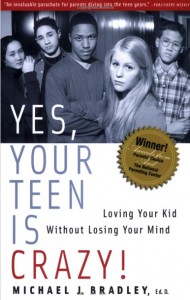 The new sex education requirement for all students in public middle and high schools is “long overdue,” writes the The New York Times (August 10, 2011). The sex education push is part of an initiative by Mayor Michael Bloomberg to address the needs of young people in minority neighborhoods, where blacks and Latinos are most affected by the consequences of early sexual behavior and unprotected sex.
The new sex education requirement for all students in public middle and high schools is “long overdue,” writes the The New York Times (August 10, 2011). The sex education push is part of an initiative by Mayor Michael Bloomberg to address the needs of young people in minority neighborhoods, where blacks and Latinos are most affected by the consequences of early sexual behavior and unprotected sex.
Critical Rules for Critical Conversations
 When all is said and done, we earn our teenagers’ trust by showing them we trust them, by being respectful, and by sharing power. Adolescents (and all children for that matter) who feel their parents are really interested in their world, feelings and experiences, are more likely to be open to learning from them.
When all is said and done, we earn our teenagers’ trust by showing them we trust them, by being respectful, and by sharing power. Adolescents (and all children for that matter) who feel their parents are really interested in their world, feelings and experiences, are more likely to be open to learning from them.
Do Love and Sex Belong Together?
 According to Christopher Ryan and Cacilda Jethá, authors of Sex at Dawn: The Prehistoric Origins of Modern Sexuality (2010), and a psychologist and practicing psychiatrist, respectively, men and women aren’t meant to be in lifelong monogamous unions. In their attempt to explain the high divorce rates in the western world, they argue that monogamy is in direct confrontation with the evolved reality of our species.
According to Christopher Ryan and Cacilda Jethá, authors of Sex at Dawn: The Prehistoric Origins of Modern Sexuality (2010), and a psychologist and practicing psychiatrist, respectively, men and women aren’t meant to be in lifelong monogamous unions. In their attempt to explain the high divorce rates in the western world, they argue that monogamy is in direct confrontation with the evolved reality of our species.
A Poem about Transformation
 The following beautiful poem captures the moment many of us have known when we dare to look at ourselves in the mirror, in search of our authentic self and our authentic voice. On that day, writes poetry critic Roger Housden (Ten Poems to Change Your life), “you simply know that you cannot continue to play by the rules you have accepted for years.” On that day you embark on a journey in which a new self, no longer controlled by the past, can mature and blossom.
The following beautiful poem captures the moment many of us have known when we dare to look at ourselves in the mirror, in search of our authentic self and our authentic voice. On that day, writes poetry critic Roger Housden (Ten Poems to Change Your life), “you simply know that you cannot continue to play by the rules you have accepted for years.” On that day you embark on a journey in which a new self, no longer controlled by the past, can mature and blossom.
Understanding the Adolescent Brain
 Starting in 1991, Dr. Jay Giedd, chief of brain imaging at the Child Psychiatry Branch of the National Institute of Mental Health, starting taking pictures of children’s brains over a period of nine years, using magnetic resonance imaging (MRI). He and his colleagues studied some 1,000 healthy kids (including two of his own) at intervals ranging from two weeks to four years.
Starting in 1991, Dr. Jay Giedd, chief of brain imaging at the Child Psychiatry Branch of the National Institute of Mental Health, starting taking pictures of children’s brains over a period of nine years, using magnetic resonance imaging (MRI). He and his colleagues studied some 1,000 healthy kids (including two of his own) at intervals ranging from two weeks to four years.
Living with Teens 101
 The more respected your teens feel, the more open they will be with you. The more power you share with them (without abdicating your role as a parent), the more trusted they will feel and in time, the more cooperative.
The more respected your teens feel, the more open they will be with you. The more power you share with them (without abdicating your role as a parent), the more trusted they will feel and in time, the more cooperative.
Parental coercion invites resistance. Rigid parental rules invite the breaking of those rules. How then, ask parents so often, do we get our teens “to behave”?
Effective Parenting in a Nutshell
 One of our most fundamental needs as human beings is to feel we belong. A child’s misbehavior is driven, not by a desire to displease the parent (whose loving acceptance s/he craves more than anything in the world), but by an unconscious need for attention and belonging (even if that is to be achieved in negative ways).
One of our most fundamental needs as human beings is to feel we belong. A child’s misbehavior is driven, not by a desire to displease the parent (whose loving acceptance s/he craves more than anything in the world), but by an unconscious need for attention and belonging (even if that is to be achieved in negative ways).
How Do I Know Mine is a Healthy Relationship?
 Montreal psychotherapist Rhonda Rabow discusses what is reasonable to expect from a healthy relationship and what is asking too much. What behaviors, she asks, are red lights to be paid attention to before a long-term commitment is made, and what behaviors are part of the workings of real relationships and can be forgiven?
Montreal psychotherapist Rhonda Rabow discusses what is reasonable to expect from a healthy relationship and what is asking too much. What behaviors, she asks, are red lights to be paid attention to before a long-term commitment is made, and what behaviors are part of the workings of real relationships and can be forgiven?